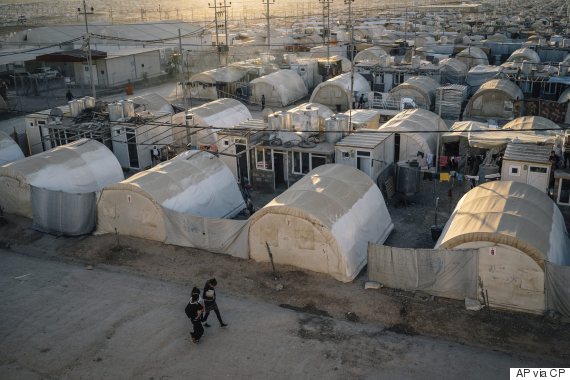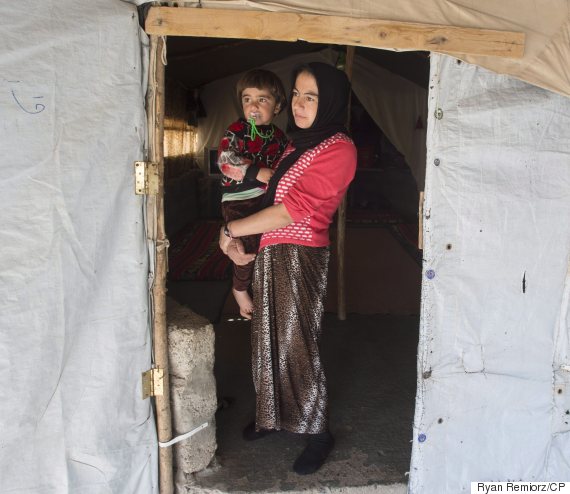Canada's Pledge To Bring In Yazidis Praised By Refugees In Iraq
CP | By Lee Berthiaume, The Canadian Press, Posted: Updated:
DOHUK, Iraq — Canada's promise to resettle hundreds of Yazidis by the end of the year is being welcomed in Iraq, where Yazidi women and girls have endured horrific abuse and persecution at the hands of ISIL.
Among those who have greeted the news with open arms is Saud Khalid, who was kidnapped by ISIL in August 2014 and sold as a sex slave three times before escaping after a year in captivity.
UN officials recently interviewed the 23-year-old about going to Canada and she's hoping she and her young son will be among the 1,200 Yazidis and other ISIL survivors accepted by the Liberal government.
"We wish to go and live in Canada because here our situation is not good in general," she said through a translator on Wednesday. "We live in bad conditions and we want to go.

In this Jan. 11, 2017 photo, Yazidi children walk carrying school books at the Kabarto camp for civilians displaced by war in Iraq. (Photo: Alice Martins/AP via CP)
"If they take me to Canada, I will never come back. And my hope is if my relatives still being held by ISIL, if they escape, I want them to also join me in Canada."
The government's plan has also been welcomed by Dr. Luma Alhanabadi, who runs Dohuk Girls and Women Treatment and Support Centre, which is partly funded by Canada.
Initially opposed to resettlement for fear survivors would face significant barriers abroad, Alhanabadi says she now supports the idea and recently submitted applications for 15 survivors to go to Canada.
Three others left for Canada this week.
Alhanabadi, whose centre offers gynecological services, counselling, therapy and legal services for about 900 ISIL survivors, said her change of heart on resettlement came after 210 survivors went to Germany.
"If they take me to Canada, I will never come back."
There they were able to finally find peace despite the language differences and an unfamiliar culture.
"Even without any therapy sessions, they feel good," she said of those who went to Germany. "So now I've changed my mind."
The UN declared last year that the Yazidis were the victims of genocide after ISIL invaded their territory in northern Iraq in August 2014. Thousands of people were captured, with the men often killed and women sold into slavery.
Yazidi survivors are considered among the most vulnerable people in Iraq, which is why Canada and other countries are offering to take them in.
Many women have lost their husbands or families and are trying to provide for children while living in camps with limited electricity and other services.
Gertrude Mubiru, head of the UN Population Fund office in Dohuk, which supports the treatment centre, said she was happy Canada was stepping up to help those in need.
"Personally, I am happy they are going to Canada because there is a lot of support and services available," she said. "They will get a chance to live."
Khalid was one of three Yazidi women who sat down with The Canadian Press to talk about the horrors they experienced after being captured and forced to live under ISIL.

A Yazidi woman and her child stand at the door of their tent at a camp for internal displaced persons, Feb. 22, 2017 in Dohuk, Iraq. (Photo: Ryan Remiorz/The Canadian Press)
Each story was similar as the women recalled trying to flee when ISIL attacked the town of Sinjar, only to be captured, separated from their families and forced to convert to Islam before being sold into slavery.
But each story was also tragic in its own way. Suham Haji, 22, was sold to six different ISIL fighters and tried to kill herself three times before she and her young son could escape after a year in captivity.
Haji, whose husband is still missing, was interviewed by the UN to resettle in Australia.
Now she and her son live with her in-laws at one of the many camps for internally displaced people scattered around Dohuk, waiting for her husband to return and a call that will take her somewhere else.
Samira Hasan, 23, lived in captivity with her two young cousins, which made it very difficult for her to escape. She talks about how an ISIL commander gave her to one of his fighters like a prize.
A family friend was eventually able to smuggle her and her cousins out of ISIL-held territory. Like the others, she arrived at the Dohuk support centre without any hope for the future, but has since found a degree of solace.
Still, she doesn't ever want to return home and would gladly move to Canada if offered the chance.
"Even if I go back, what will I do? It will never be the same," she said in Kurdish. "It's a good thing Canada is accepting more Yazidis, and I want to go to Canada or somewhere else."
The Yazidis are a Kurdish-speaking minority who lived mainly in northern Iraq before their home territory was invaded by ISIL. They practice an ancient religion and their beliefs are regarded as heretical by ISIL.







 Persecuted for their beliefs and driven from their homes, the Yazidis have had a long history of suffering.
Persecuted for their beliefs and driven from their homes, the Yazidis have had a long history of suffering.





